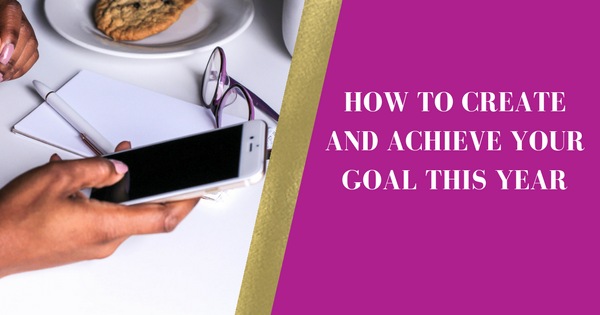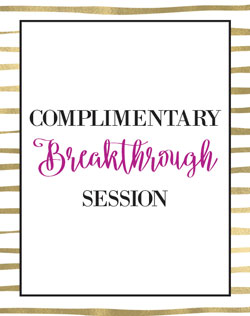Hey beautiful, I’ve always loved going out to the store just so I could buy the cutest planner and start writing down life goals for the year. I would always get back home and immediately start writing all the things I wanted to accomplish, and the date I wanted to accomplish them. Doing this would get me super excited and give me high hopes that I would actually accomplish EVERYTHING on that list. Well, some years I accomplished all of them and other years I didn’t accomplish any. And after looking back at what it took to accomplish my goals I started to notice a very simple pattern that I did every single time; I set up SMART goals.
SMART is an acronym that is often credited to Peter Drucker in his management by objectives concept. SMART is a way to get clarity on your goal and have an actionable starting point on how you’ll achieve it. There are so many variations of the acronym out there, and today I want to share with you the version I use that helps to connect deeper to your goals so that you can stay motivated in achieving them.
SPECIFIC
Your goal needs to be as specific as possible. This is important because you want to be very clear on what you want to achieve. The beginning of any goal coming to life is knowing exactly what it is and what it looks like. Doing this will help you know when you’ve achieved it. The question you’ll want to ask yourself is:
“What do I want to accomplish?”
Example: I want to publish an E-book on the benefits of clean eating.
MEANINGFUL
Next you’ll want to determine if your goal is meaningful enough. Does achieving this goal have a significant importance or purpose in your life? This is the beginning of building the connection between you and your goal; and having this connection will keep you motivated even when things get difficult. The questions you’ll want to ask yourself are:
“Why do I want to achieve this goal?” and “how will achieving it effect my life?”
Example: I want to publish an E-book on the benefits of clean eating because eating this way has helped me stay healthy and have more energy. This is something I believe everyone should know about because it has helped change my life. Publishing this book will effect my life because it will build a gateway for me to get my message out there and build a business on my desire to save lives through clean eating.
ACHIEVABLE
After you’ve connected with your goal, you’ll want to measure whether it’s achievable. Do you have the skills and can you find resources that will help you accomplish this goal? You want to stretch yourself beyond your comfort zone, but still maintain the belief that achieving this goal is possible for you. When you feel like it’ll be hard or almost impossible to achieve something, it will be easier to become defeated and lose motivation in achieving it. Ask yourself this:
“Do I believe that I can have everything I need to accomplish this goal?”
Example: Yes! I believe that I have everything I need to publish my E-book on the benefits of clean eating. I have the internet, books, and other resources that will give me the information and instruction I need to write, edit, publish, and promote this E-book. I also have 2-4 hours per day to write my book and effectively market it. And thank goodness for technology because now I can self-publish and sell it online on places like createspace.
REWARDING
Plain and simple, will this goal add joy and fulfillment to your life? Is it something you actually want to do? Will you feel good about putting in the work to accomplish it? You want your goal to be a rewarding experience, both during the process and after. Nothing screams “bored and unmotivated” than to be working on a goal that you don’t enjoy and are simply not passionate about. And of course, you’ve got to ask yourself:
“Is this goal in line with my overall purpose?” and “Is it worth achieving, even if the process becomes difficult?”
Example: Publishing an E-book on the benefits of clean eating is the starting point in building my business as a heathy eating educator. It’s in line with my purpose and it’s something that gives me joy and fulfillment because I’m passionate about sharing all the information I know that will help change people’s lives towards health.
TIME-BASED
Having a time-based goal is easier to accomplish than having an open-ended goal with no target date. It’s easier to procrastinate when you’re just going with the flow and putting in the work whenever you feel like it. One of the benefits of setting a target date is that you can set mini target dates for working on certain tasks that will get you closer to your goal. This will keep you organized and actively engaged, while experiencing less overwhelm. Ask yourself:
“What’s the date I want to accomplish my goal?” “What can I do in the next week, month, 3 months, 6 months leading up to my target date?”
Example: This week I will do research on strategies on developing an E-book. The next 3 months will be dedicated to writing the content of my book. In 6 months I want to already have the editing done and start marketing the book before it launches. In 8 months I want to start book pre-orders.
This SMART way of writing down your goals is a great way to be organized, motivated, and clear about what you’re working to achieve. It can also help to check in with yourself frequently on whether you’re still aligned to your goal. I usually read over my SMART goal once a week while I’m planning for the week ahead. Let me know in the comments below, what’s the SMART goal you’re currently working on?
Always and Forever
~Nozipho





